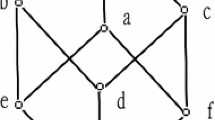Abstract
Subsystem based generalizations of rough set approximations are investigated. Instead of using an equivalence relation, an arbitrary binary relation is used to construct a subsystem. By exploring the relationships between subsystems and different types of binary relations, we examine various classes of generalized approximation operators. The structures of subsystems and the properties of approximation operators are analyzed.
Preview
Unable to display preview. Download preview PDF.
Similar content being viewed by others
References
Cattaneo, G.: Abstract approximation spaces for rough theories. In: Polkowski, L., Skowron, A. (eds.) Rough Sets in Knowledge Discovery, pp. 59–98. Physica-Verlag, Heidelberg (1998)
Cohn, P.M.: Universal Algebra. Harper and Row Publishers, New York (1965)
Järvinen, J.: On the structure of rough approximations. In: Alpigini, J.J., Peters, J.F., Skowron, A., Zhong, N. (eds.) RSCTC 2002. LNCS (LNAI), vol. 2475, pp. 123–130. Springer, Heidelberg (2002)
Kortelainen, J.: On relationship between modified sets, topological spaces and rough sets. Fuzzy Sets System 61, 91–95 (1994)
Pawlak, Z.: Rough sets. International Journal of Computer and Information Sciences 11, 341–356 (1982)
Pawlak, Z.: Rough classification. International Journal of Man-Machine Studies 20, 469–483 (1984)
Pawlak, Z.: Rough Sets: Theoretical Aspects of Reasoning about Data. Kluwer Academic Publishers, Boston (1991)
Pomykala, J.A.: Approximation operations in approximation space. Bulletin of the Polish Academy of Sciences, Mathematics 35, 653–662 (1987)
Pomykala, J.A.: On definability of nondeterministic information system. Bulletin of the Polish Academy of Sciences, Mathematics 36, 193–210 (1988)
Shi, H.Y.: A Study of Constructive Methods of Rough Sets, M.Sc. Thesis, Lakehead University, Canada (2004)
Skowron, A.: On topology in information systems. Bulletin of the Polish Academy of Sciences, Mathematics 36, 477–479 (1989)
Wiweger, A.: On topological rough sets. Bulletin of the Polish Academy of Sciences, Mathematics 37, 89–93 (1989)
Yao, Y.Y.: Two views of the theory of rough sets in finite universe. International Journal of Approximate Reasoning 15, 291–317 (1996)
Yao, Y.Y.: Constructive and algebraic methods of the theory of rough sets. Information Sciences 109, 21–47 (1998)
Yao, Y.Y.: Relational interpretations of neighborhood operators and rough set approximation operators. Information Sciences 111, 239–259 (1998)
Yao, Y.Y.: Generalized rough set models. In: Polkowski, L., Skowron, A. (eds.) Rough Sets in Knowledge Discovery, pp. 286–318. Physica-Verlag, Heidelberg (1998)
Yao, Y.Y.: On generalizing Pawlak approximation operators. In: Polkowski, L., Skowron, A. (eds.) RSCTC 1998. LNCS (LNAI), vol. 1424, pp. 298–307. Springer, Heidelberg (1998)
Yao, Y.Y.: Information granulation and rough set approximation. International Journal of Intelligent Systems 16, 87–104 (2001)
Yao, Y.Y.: On generalizing rough set theory. In: Wang, G., Liu, Q., Yao, Y., Skowron, A. (eds.) RSFDGrC 2003. LNCS (LNAI), vol. 2639, pp. 44–51. Springer, Heidelberg (2003)
Yao, Y.Y., Lin, T.Y.: Generalization of rough sets using modal logic. Intelligent Automation and Soft Computing, An International Journal 2, 103–120 (1996)
Yao, Y.Y., Wong, S.K.M., Lin, T.Y.: A review of rough set models. In: Lin, T.Y., Cercone, N. (eds.) Rough Sets and Data Mining: Analysis for Imprecise Data, pp. 47–75. Kluwer Academic Publishers, Boston (1997)
Zakowski, W.: Approximations in the space (U, Π). Demonstratio Mathematics XVI, 761-769 (1983)
Author information
Authors and Affiliations
Editor information
Editors and Affiliations
Rights and permissions
Copyright information
© 2005 Springer-Verlag Berlin Heidelberg
About this paper
Cite this paper
Yao, Y., Chen, Y. (2005). Subsystem Based Generalizations of Rough Set Approximations. In: Hacid, MS., Murray, N.V., Raś, Z.W., Tsumoto, S. (eds) Foundations of Intelligent Systems. ISMIS 2005. Lecture Notes in Computer Science(), vol 3488. Springer, Berlin, Heidelberg. https://doi.org/10.1007/11425274_22
Download citation
DOI: https://doi.org/10.1007/11425274_22
Publisher Name: Springer, Berlin, Heidelberg
Print ISBN: 978-3-540-25878-0
Online ISBN: 978-3-540-31949-8
eBook Packages: Computer ScienceComputer Science (R0)




